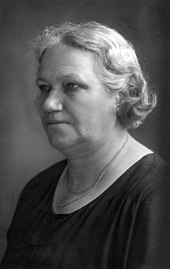Suze Groeneweg
Susanna "Suze" Groeneweg (born March 4, 1875 in Strijensas , † October 19, 1940 in Barendrecht ) was a Dutch politician and board member of the Sociaal-Democratische Arbeiderspartij (SDAP). In 1918 she was elected as the first female member of parliament to the Second Chamber of the States General .
biography
Groeneweg was born in 1875 as the third of five children of the shopkeeper and farm worker Arie Groeneweg and his wife Emmigje de Ruiter. After graduating from school, she went to Numansdorp in 1889 to begin training as a teacher. From 1893 she taught in Krimpen aan den IJssel , Dordrecht and Montfort , where she worked at a school for girls. Dissatisfied with the situation at the school, she joined the teachers' union Bond van Nederlandsche Onderwijzers in 1902 . Furthermore, she was active at the time in the Nederlandsche Vereeniging tot Afschaffing van Alcoholhoudende Dranken , an association that campaigned for the ban on alcoholic beverages in the Netherlands.
In 1903 Groeneweg began to be politically active for the first time and became a member of the Sociaal Democratische Arbeiders Partij , the forerunner of today's social democratic Partij van de Arbeid . In the same year she moved to Rotterdam , where she soon accepted a position on the SDAP departmental board there. In this capacity, she regularly gave speeches at demonstrations and party congresses. Within the party, she campaigned for equality for women, but was a passionate opponent of separate women's rights organizations such as the Bond van Sociaal-Democratische Vrouwenclubs (BSDVC), because, according to Groeneweg, these only emphasize the unequal social position of women. She also refused to speak in front of an exclusively female audience. In the 1910s she rose within the ranks of the SDAP, up to and including her election to the party's national executive committee in 1914. She held this post until 1936.
As a result of various electoral law reforms and constitutional amendments , the Netherlands introduced active suffrage for men and passive suffrage for women in 1917. In the first elections carried out under these new regulations on July 3, 1918 , Groeneweg was elected as the first woman to the second chamber of the Dutch Parliament, the States General . She remained the only female member of this institution until 1921. At the beginning of her parliamentary term, Groeneweg had to contend with considerable prejudice. For example, the way to the washrooms specially set up for them was called the Groenewegje behind closed doors . A street in the red light district of The Hague had the same name at the time . In her first speech in Parliament, she spoke about the difficult situation of the soldiers' wives, whose husbands had been mobilized because of the First World War . She also went into the conditions in the military accommodations. From 1919 she also had a seat in the Provinciale Staten of the Province of Zuid-Holland (until 1937) and in the Rotterdam City Council (until 1931). As part of her parliamentary work, she mainly campaigned for classic social democratic issues such as women's rights, education and disarmament . One of her successes was the introduction of maternity leave for married and unmarried women in 1929. In 1931 she was appointed registrar, after which Groeneweg became the first woman in the Netherlands to perform a legal marriage. For health reasons, she withdrew from the Second Chamber of the States General in 1937 and finally died in 1940 in Barendrecht, South Holland.
Honors
In 1937 Groeneweg was accepted into the Order of the Dutch Lion with the rank of knight . Today, in addition to various streets and squares, the PvdA's training institute, the Suze Groenewegschool , is named after her. Furthermore, every two years on International Women's Day, the Suze Groenewegprijs voor roldoorbrekende initiatieven (in German: "Suze Groeneweg Prize for pioneering initiatives") is awarded.
Publications
In the course of her career, Groeneweg published a number of articles in magazines as well as articles in compilations. Most of them dealt with the emancipation of women or the fight against alcohol abuse:
- What concern heeft de arbeidersvrouw bij het works of the SDAP? (Rotterdam 1906)
- Vak Moving en geheelonthouding (Rotterdam 1916)
- Het moederschap in eere! Een pleidooi voor moederschapszorg (Amsterdam 1918)
- Het algemeen vrouwenkiesrecht een mannenbelang (Amsterdam 1918)
- Drankbestrijding as moederschapszorg (Utrecht 1921)
- De vrouw in het openbare leven (Utrecht 1922)
- Onze plicht en onze vreugde (Amsterdam 1927)
- Het aanvullend onderwijs voor de rijpere jeugd (1930)
- Alright, alright! (Amsterdam 1933)
literature
- AEJ de Vries-Bruins: Suze Groeneweg. Hair betekenis voor de modern workers movement . Ed .: Sociaal Democratische Arbeiders Partij. De Arbeiderspers, Amsterdam 1937.
Web links
- Groeneweg's biography at huygens.knaw.nl (Dutch)
- Overview of Groeneweg's political offices at parlement.com (Dutch)
Individual evidence
- ↑ Mark Barrois: Suze Groeneweg betrad as first vrouw de Tweede Kamer. In: historiek.net. March 14, 2019, accessed August 15, 2019 (Dutch).
- ↑ Christa van Zeggeren: Suze Groeneweg, de eerste vrouw in de Tweede Kamer. In: gendergeschiedenis.nl. Vereniging voor Gendergeschiedenis, accessed on August 15, 2019 (Dutch).
| personal data | |
|---|---|
| SURNAME | Groeneweg, Suze |
| ALTERNATIVE NAMES | Groeneweg, Susanna (full name) |
| BRIEF DESCRIPTION | Dutch politician and first female member of the Second Chamber of the States General |
| DATE OF BIRTH | March 4, 1875 |
| PLACE OF BIRTH | Strijensas |
| DATE OF DEATH | October 19, 1940 |
| Place of death | Barendrecht |
